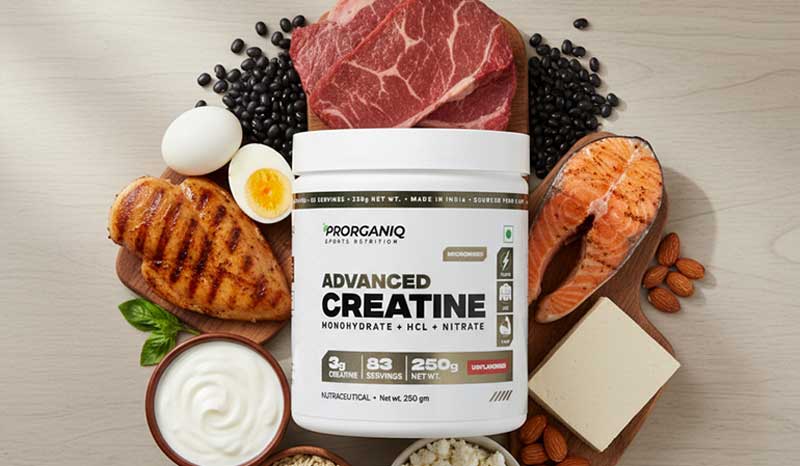Is Creatine Non Veg? The Truth Revealed
With the rise of fitness culture across India, dietary supplements like creatine are gaining mainstream popularity.
Whether you're a gym-goer in Delhi, a sprinter in Bangalore, or a yoga enthusiast in Pune, chances are you’ve heard about creatine.
But among the many questions Indian fitness enthusiasts ask, one stands out loud and clear: "Is creatine non-veg?"
What is Creatine and Why Is It So Popular?
Creatine is a natural compound made up of three amino acids: arginine, glycine, and methionine.
It plays a crucial role in helping your body produce energy during short bursts of intense activity, such as lifting weights or sprinting.
Your liver, kidneys, and pancreas produce small amounts of creatine.
But about 95% of it is stored in your muscles, where it helps replenish a molecule called ATP (adenosine triphosphate), your body’s primary energy currency.
Why Do Fitness Enthusiasts Use Creatine?
In India’s growing fitness scene, creatine is often touted as one of the most scientifically studied and effective supplements. It helps with:
-
Increased muscle strength and power
-
Faster muscle recovery
-
Improved high-intensity exercise performance
-
Potential brain health benefits
The key reason it’s so widely used is that it works and is one of the few supplements backed by decades of clinical research.
Is Creatine Non-Veg?
Most creatine supplements are synthetically made and vegetarian-friendly, even though natural creatine is found only in non-veg foods like meat and fish.
✅ Creatine in Supplements: The Manufacturing Process
Most creatine supplements available in India and abroad, especially those labeled "Creatine Monohydrate," are synthetically manufactured in laboratories, not derived from animals.
They are made using chemical reactions involving sarcosine (a compound similar to amino acids) and cyanamide.
These are combined, heated, and processed to form creatine monohydrate crystals the form found in most supplements.
✅ So, Is Synthetic Creatine Veg?
The short answer is: Yes, it is vegetarian.
There is no animal tissue or meat extract involved in this chemical process.
Therefore, synthetic creatine is considered vegetarian-friendly and even vegan-friendly, unless processed with non-veg fillers or gelatin capsules (more on this below).
✅ What About Older or Niche Products?
Some creatine products in the past or obscure brands may have used animal extracts, particularly from meat or fish.
But these are extremely rare today, especially in mainstream, reputable Indian or global brands.
To be 100% sure, always check the label for a green dot (vegetarian symbol) and scan the ingredient list for any animal derivatives or gelatin.
Is Creatine Found in Natural Food Sources?
Yes, creatine does exist in natural food sources, but only in animal-based products. This is why confusion arises in India regarding its classification as veg or non-veg.
Natural Creatine-Rich Foods:
-
Red Meat: Beef, lamb, and pork are all rich in creatine.
-
Fish: Especially herring, salmon, and tuna.
-
Poultry: Chicken contains some creatine, though less than red meat.
These foods typically provide 1 to 2 grams of creatine per 100 grams of meat.
That may sound like a decent amount, but athletes generally supplement with 3 to 5 grams per day to get performance benefits at a level hard to achieve with food alone, especially for vegetarians.
Vegetarian and Vegan Foods
Here’s the catch: plant-based foods do not contain creatine. Lentils, paneer, dal, soya chunks, tofu, while nutritious, have zero creatine.
This fact brings us to the main point of concern: since creatine is naturally present only in non-veg sources, does that mean creatine supplements are non-veg too?
Can Vegetarians and Vegans in India Take Creatine Safely?
Yes, absolutely. If you're a vegetarian or vegan looking to boost your gym performance, creatine is a safe and effective option provided it’s synthetic and marked as vegetarian.
Vegetarians and vegans may experience even greater benefits from creatine supplementation because:
-
Their muscle creatine stores tend to be lower due to the lack of dietary intake.
-
Supplementation helps bridge this gap, resulting in more noticeable performance gains.
How to Choose Vegetarian or Vegan Creatine in India
Here are some tips for Indian buyers:
-
Look for the green dot symbol (used in Indian food and supplements to indicate vegetarian products).
-
Choose creatine monohydrate powder, especially from well-known brands like Optimum Nutrition, MuscleBlaze, or HealthKart.
-
Avoid gel capsules unless specifically marked vegetarian (they may contain animal-derived gelatin).
-
Check for certifications like FSSAI, GMP, or ISO that indicate manufacturing standards.
-
When in doubt, contact the brand or check their website for ingredient transparency.
Creatine and Indian Dietary Beliefs: Religious and Ethical Viewpoints
In India, dietary decisions are not just about nutrition; they are deeply connected to religion, ethics, culture, and family traditions.
✔️ Hinduism and Vegetarianism
Many Hindus follow a vegetarian lifestyle out of spiritual or karmic beliefs.
Since synthetic creatine contains no meat or animal derivatives, most Hindu vegetarians can take it without violating religious principles, provided the supplement is certified vegetarian.
✔️ Jainism and Veganism
Jains follow stricter dietary rules and may avoid even root vegetables. Some may still accept synthetic creatine if:
-
It is 100% lab-made,
-
Not tested on animals,
-
Free from gelatin or other animal-processing agents.
In this case, look for vegan certifications to be absolutely sure.
✔️ Muslim and Christian Consumers
For non-vegetarian Muslims and Christians in India, the concern may not be about meat per se, but whether the product is Halal or ethically sourced.
Some international brands now offer Halal-certified creatine as well.
Conclusion
India’s fitness and wellness culture is evolving, and with it comes an increasing demand for ethical, transparent, and effective supplementation.
If you’ve ever hesitated to use creatine because you feared it was non-veg, rest assured, most creatine supplements in India today are lab-made and 100% vegetarian.
By choosing the right product, reading the label carefully, and aligning it with your values, you can enjoy the full power of creatine without compromising on your dietary beliefs.


